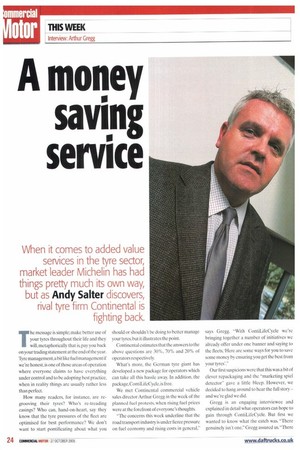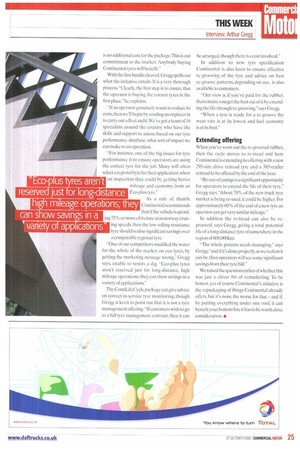A money saving service
Page 24

Page 25

If you've noticed an error in this article please click here to report it so we can fix it.
When it comes to added value services in the tyre sector, market leader Michelin has had things pretty much its own way, but as Andy Salter discovers, rival tyre firm Continental is fighting back.
The message is simple; make better use of your tyres throughout their life and they will, metaphorically that is, pay you back on your trading statement at the end of the year. Tyre management, a bit like fuel management if we're honest, is one of those areas of operation where everyone claims to have everything under control and to be adopting best practice, when in reality things are usually rather less than perfect.
How many readers, for instance, are regrooving their tyres? Who's re-treading casings? Who can, hand-on-heart, say they know that the tyre pressures of the fleet are optimised for best performance? We don't want to start pontificating about what you should or shouldn't be doing to better manage your tyres, but it illustrates the point.
Continental estimates that the answers to the above questions are 30%, 70% and 20% of operators respectively What's more, the German tyre giant has developed a new package for operators which can take all this hassle away. In addition, the package. Con tiLi feCvcle, is free.
We met Continental commercial vehicle sales director Arthur Gregg in the week of the planned fuel protests, when rising fuel prices were at the forefront of everyone's thoughts.
"The concerns this week underline that the road transport industry is under fierce pressure on fuel economy and rising costs in general," says Gregg. "With ContiLifeCycle we're bringing together a number of initiatives we already offer under one banner and saying to the fleets, 'Here are some ways for you to save some money by ensuring you get the best from your tyres'."
Our first suspicions were that this was a bit of clever repackaging and the "marketing spiel detector" gave a little bleep. However, we decided to hang around to hear the full story— and we're glad we did.
Gregg is an engaging interviewee and explained in detail what operators can hope to gain through ContiLifeCycle. But first we wanted to know what the catch was. "There genuinely isn't one,Gregg assured us. "There is no additional cost for the package.This is our commitment to the market. Anybody buying Continental tyres will benefit."
With the first hurdle cleared, Gregg spells out what the initiative entails, it is a very thorough process. "Clearly, the first step is to ensure that the operator is buying the correct tyres in the first place," he explains.
"If an operator genuinely wants to reduce its costs, then we'll begin by sending an engineer in to carry out a fleet audit.We've got a team of 16 specialists around the country who have the skills and support to assess, based on our tyre performance database, what sort of impact we can make to an operation.
"For instance, one of the big issues for tyre performance is to ensure operators are using the correct tyre for the job. Many will often select a regional tyre for their application, when on inspection they could be getting better mileage and economy from an Eco-plus tyre."
As a rule of thumb. Continental recommends that if the vehicle is spending 75% or more of its time at motorway cruising speeds, then the low rolling resistance tyre should realise significant savings over a comparable regional tyre.
"One of our competitors muddied the water for the whole of the market on eco tyres, by getting the marketing message wrong," Gregg says, unable to resists a dig. ..Eco-plus tyres aren't reserved just for long-distance, high mileage operations; they can show savings in a variety of applications."' The ContiLifeCycle package can give advice on correct in-service tyre monitoring, though Gregg is keen to point out that it is not a tyre management offering." If customers wish to go to a full tyre management contract, then it can be arranged, though there is a cost involved."
In addition to new tyre specification Continental is also keen to ensure effective re-grooving of the tyre and advice on best re-groove patterns, depending on use, is also available to customers.
"Our view is, if you've paid for the rubber, then ensure you get the best out of it by extending the life through re-grooving," says Gregg.
"When a tyre is ready for a re-groove the wear rate is at its lowest and fuel economy is at its best."
Extending offering
When you've worn out the re-grooved rubber, then the cycle moves to re-tread and here Continental is extending its offering with a new 295-size drive retread tyre and a 385-trailer retread to be offered by the end of the year.
"Re-use of casings is a significant opportunity for operators to extend the life of their tyre," Gregg says. "About 70% of the new truck tyre market is being re-used, it could be higher. For approximately 60% of the cost of a new tyre an operator can get very similar mileage."
In addition the re-tread can also he regrooved, says Gregg, giving a total potential life of a long-distance tyre of somewhere in the region of 600,000km.
"The whole process needs managing," says Gregg,"and if it's done properly.as we reckon it can be, then operators will see some significant savings from their tyre bill."
We raised the question earlier of whether this was just a clever bit of remarketing. To be honest, yes of course Continental's initiative is the repackaging of things Continental already offers, but it's none the worse for that — and if, by putting everything under one roof, it can benefit your bottom line it has to be worth close consideration. •










































































































































































































